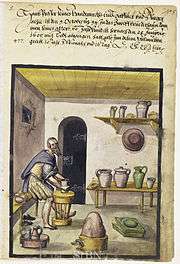Artisan
.jpg)

An Artisan (from French: artisan, Italian: artigiano) is a skilled craft worker who makes or creates things by hand that may be functional or strictly decorative, for example furniture, decorative arts, sculptures, clothing, jewellery, household items and tools or even mechanical mechanisms such as the handmade clockwork movement of a watchmaker. Artisans practice a craft and may through experience and aptitude reach the expressive levels of an artist.
The adjective "artisanal" is sometimes used in describing hand-processing in what is usually viewed as an industrial process, such as in the phrase artisanal mining. Thus, "artisanal" is sometimes used in marketing and advertising as a buzz word to describe or imply some relation with the crafting of handmade food products, such as bread, beverages or cheese. Many of these have traditionally been handmade, rural or pastoral goods but are also now commonly made on a larger scale with automated mechanization in factories and other industrial areas.
Artisans were the dominant producers of consumer products prior to the Industrial Revolution. According to classical economics theory, the division of labour occurs with internal market development (Adam Smith). However, according to economist John Hicks, merchants and artisans originated as servants to the rulers.
Medieval artisans
During the Middle Ages, the term "artisan" was applied to those who made things or provided services. It did not apply to unskilled manual labourers. Artisans were divided into two distinct groups: those who operated their own businesses and those who did not. Those who owned their businesses were called masters, while the latter were the journeymen and apprentices. One misunderstanding many people have about this social group is that they picture them as "workers" in the modern sense: employed by someone. The most influential group among the artisans were the masters, the business owners. The owners enjoyed a higher social status in their communities.[1]
Shokunin
Shokunin is a Japanese word for "artisan" or "craftsman", which also implies a pride in one's own work. In the words of shokunin Tashio Odate:
Shokunin means not only having technical skill, but also implies an attitude and social consciousness... a social obligation to work his best for the general welfare of the people, [an] obligation both material and spiritual.[2]
Traditionally, shokunin honoured their tools of trade at New Year's - the sharpened and taken-care of tools would be placed in a tokonoma (a container or box still found in Japanese houses and shops), and two rice cakes and a tangerine (on top of rice paper) were placed on top of each toolbox, to honour the tools and express gratitude for performing their task.[2]
Gallery
-

Armorer, 1425
-

Blacksmith, 1606
-

Bladesmith, 1564
-

Joiner, 1425
-

Cooper, 1608
-

Dyer, 1433
-

Furrier, 1543
-

Goldsmith, 1543
-

Gunsmith, 1613
-

Hatter, 1533
-

Locksmith, 1600
-

Nailsmith, 1529
-

Potter, 1605
-

Ropemaker, 1616
-

Saddler, 1470
-

Shoemaker, 1535
-

Stonemason, 1550
-

Tailor, 1425
-

Tanner, 1473
-

Weaver, 1524
-

Wheelwright, 1545
See also
References
- ↑ History of Western Civilization, Boise State University http://history.boisestate.edu/westciv/medsoc/23.shtml
- 1 2 Nagyszalanczy, Sandor (2000). The Art of Fine Tools. Taunton Press. p. 131. ISBN 1561583618.
External links
-
 The dictionary definition of artisan at Wiktionary
The dictionary definition of artisan at Wiktionary - History of Artisans
|